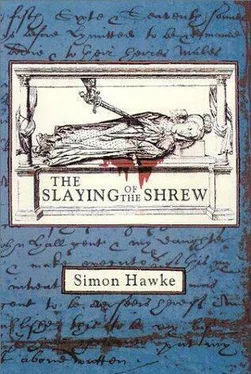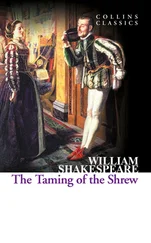Simon Hawke - The Slaying Of The Shrew
Здесь есть возможность читать онлайн «Simon Hawke - The Slaying Of The Shrew» весь текст электронной книги совершенно бесплатно (целиком полную версию без сокращений). В некоторых случаях можно слушать аудио, скачать через торрент в формате fb2 и присутствует краткое содержание. Жанр: Исторический детектив, на английском языке. Описание произведения, (предисловие) а так же отзывы посетителей доступны на портале библиотеки ЛибКат.
- Название:The Slaying Of The Shrew
- Автор:
- Жанр:
- Год:неизвестен
- ISBN:нет данных
- Рейтинг книги:5 / 5. Голосов: 1
-
Избранное:Добавить в избранное
- Отзывы:
-
Ваша оценка:
- 100
- 1
- 2
- 3
- 4
- 5
The Slaying Of The Shrew: краткое содержание, описание и аннотация
Предлагаем к чтению аннотацию, описание, краткое содержание или предисловие (зависит от того, что написал сам автор книги «The Slaying Of The Shrew»). Если вы не нашли необходимую информацию о книге — напишите в комментариях, мы постараемся отыскать её.
The Slaying Of The Shrew — читать онлайн бесплатно полную книгу (весь текст) целиком
Ниже представлен текст книги, разбитый по страницам. Система сохранения места последней прочитанной страницы, позволяет с удобством читать онлайн бесплатно книгу «The Slaying Of The Shrew», без необходимости каждый раз заново искать на чём Вы остановились. Поставьте закладку, и сможете в любой момент перейти на страницу, на которой закончили чтение.
Интервал:
Закладка:
If Andrew Braithwaite could be considered handsome, Smythe thought, then Phillipe Dubois was very nearly beautiful to the point of femininity. Smythe had never before seen anyone quite like him. He could not have been very much older than twenty or so, but it was somewhat difficult to tell, for Dubois painted his face and wore a beauty mark, and his curled hair was so long that it hung almost to his waist. He clearly lavished a great deal of attention upon it and Smythe noticed not a few women gazing at his dark tresses with undisguised envy. Nor was envy the only emotion that Dubois seemed to engender in many of the ladies present.
He was tall, well-formed, and graceful to the point of being langorous. His slightest gesture seemed elegant, studied and deliberate, and his demeanor was the very epitome of cultured charm, which this French Huguenot supporter of Henry of Navarre wielded most adroitly and disarmingly.
Smythe had detested him on sight, in no small part because earlier he had observed Dubois walking with Elizabeth upon his arm, and Elizabeth seemed rather taken with him. It seemed unlikely, however, that this effete fop could be one of the plotters whom he had overheard, for those men both had English accents, and while Dubois spoke excellent English, his accent was unquestionably French. Nevertheless, Dubois had arrived together with his father, a French aristocrat who smiled at everyone, yet spoke to no one because, according to his son, he had gone completely deaf from some injury sustained upon the battlefield.
Then there was Hughe Camden of Pendennis, who had arrived at the estate with his father, Sir Richard. Smythe was not quite sure what to think of Sir Richard and his son. He supposed they could have been the men that he had overheard, although he could not say for certain. The white-bearded Sir Richard seemed rather aloof and close-mouthed, and acted as if he disdained the company that he was keeping. His short, curdy polite, yet somewhat irritable replies to any comments or questions that were addressed to him discouraged conversation. The general impression was that Sir Richard Camden was a solitary gentleman of leisure, and no one was quite certain what he had done to merit a knighthood. Knights, said Worley, who spoke as one, were even harder to keep track of than barons, earls and viscounts. Indeed, there was concern among some of the nobility that the rank of knight was being diminished by the recent increase in the ranks of knighthood.
“In the old days,” Sir William had said, “a mere merchant shipbuilder such as I would never have been knighted. But as I have done much to increase the royal coffers, so hath Her Majesty seen fit to increase my honor through my rank. ‘Twas a generous offer, and one that I could scarcely refuse, you understand. But at the same time, neither did I campaign for it, as so many others have, and continue to do, often successfully. Why, if one were to throw a stone at some annoying dog in London these days, one would be just as liable to miss and strike a knight. So then, Sir Richard Camden may indeed be entitled to wear spurs, for all I know. And then again, he just as well may not be. For my part, I do not know him from Adam. He and his son, therefore, must remain suspect, at least until I can find out more about them.”
For the present, it seemed somewhat easier to learn something of the younger Camden. Hughe was a slightly built, studious-looking young man in his mid-twenties, with a neatly-trimmed beard and moustache, and a thick shock of dark and curly hair that came just to his shoulders. He seemed as self-effacing in his dress as did Andrew Braithwaite in his manner, affecting somber hues of black and brown in his simple, unadorned doublet, breeches and hose with a plain, though well-made shoulder cloak. He was a student of the law, an inner barrister at the Inns of Court, and had a great fondness for poetry, which he had been observed to write in a fine Chancery hand well worthy of a scrivener. He seemed an amiable and pleasant enough fellow, and Middleton said he had applied for and been given a small stipend as Blanche’s tutor in poetry and literature while they were at their home in London. He seemed clearly smitten with her and she, in turn, seemed not averse to his company, but at the same time, Smythe had the distinct impression that there were few males between the ages of eighteen and eighty to whose company Blanche Middleton might actually be averse.
Finally, that left Sir Roger Holland and his son, Daniel. Sir Roger had, apparently, won his knighthood on the field of battle in his younger days, had married well, sired a brood of children, and was now primarily devoted to managing his wife’s fortune and her property in Lincolnshire. Beyond that, Middleton had said, he had not revealed very much of substance. He dressed reasonably well, if somewhat unfashionably, and had, in fairly short order, established himself as a crashing bore. He spoke of little else save hunting and his “sports”-the dogs he raised for fighting-and of those two subjects, he spoke almost incessantly. Middleton had said that regardless of what anyone tried to speak with him about, within moments Sir Roger would turn the conversation back to dog fighting or hunting and drone on with so much throat-clearing and hemming and hawing and harrumphing that one would be reminded of the sounds made by a pair of rutting hogs. apparently, he did not seem to notice that anyone he struck up a conversation with thereafter tended to avoid him as if he had the pox. Or, perhaps that was his intent.
Daniel Holland seemed much more amiable than his father, and looked a few years older than both Braithwaite and Camden, and possibly Dubois, for the latter’s age was not easy to determine and he had not volunteered it. However, what Daniel Holland may have lacked in youth, he made up for with a confident maturity that made him appear very self-possessed. Without saying so in so many words, he managed to give off the impression that he felt himself unquestionably superior to his rivals, and he positively smirked whenever his gaze fell upon the elegant Dubois. Blonde, bearded, green-eyed and good looking without quite being handsome, young Holland was of average height and stocky build. Being a gentleman of means, he had no need of a trade, although he claimed to know something of horses and their breeding. He stood to inherit a considerable amount of land and also spoke vaguely of some investments that he made in the New World.
Any of them, Smythe thought, could be the plotters he had overheard in the maze, though some seemed more likely candidates than others. There seemed to be no way, at least for the present, to verify their true status or their claims, and Smythe was certainly in no position to question their veracity. To his immense frustration, he was not able to recognize any of their voices. Dubois’ voice seemed the most unlike those that he had overheard, as did his accent, but then again, the accent could be something he was faking, although if he was, he was certainly convincing, and his father spoke not at all, which Smythe found a bit suspicious. Of the remaining three, Daniel Holland seemed, perhaps, the least likely to be one of the plotters, as both Worley and Middleton had thought, as well. He neither looked nor acted like a rogue, and if Smythe were casting for the part, Daniel Holland would probably have been the last one that he would pick. He looked like a student at the Inns of Court, and he seemed very well educated. He quoted poetry and wrote it. Yet since Sir William had departed, Smythe had noticed something else about young Holland that had given him some pause.
Most well-dressed gentlemen went armed, and the guests at Middleton Manor were no exception, especially the young, fashionable men who vied for Blanche Middleton’s attention. Dubois, as might be expected of a French chevalier, had a very showy blade, a rapier with a curvaceous basket hilt and jewelled crossguards. It seemed quite well made, though Smythe was unable to make a close inspection. However, it made sense that a man who could afford the sort of elegant clothing Dubois wore would also be able to afford a first-class blade. Whether or not he knew how to use it was another matter entirely. He wore it in a rakish hanger, but beyond that, Smythe had his doubts that the blade had ever been drawn in practice, much less combat. Likewise, Braithwaite and Camden both wore blades, and if they were not as showy and expensive looking as the Frenchman’s, they were nevertheless quite handsome. Daniel Holland, on the other hand, who looked as if wearing a blade would suit him about as well as a silk dressing gown would suit a horse, wore a rather plain-looking rapier with a cup hilt and hooked cross-guards. It was of Spanish design, and it was most certainly not the blade of a courtier or fop or roaring boy. It was the purposeful blade of a duelist. It was, of course, quite possible that Holland had purchased it cheaply in the city from some down-on-his-luck soldier and had no more idea how to use it than Smythe had of writing poetry. But Smythe found it interesting, just the same.
Читать дальшеИнтервал:
Закладка:
Похожие книги на «The Slaying Of The Shrew»
Представляем Вашему вниманию похожие книги на «The Slaying Of The Shrew» списком для выбора. Мы отобрали схожую по названию и смыслу литературу в надежде предоставить читателям больше вариантов отыскать новые, интересные, ещё непрочитанные произведения.
Обсуждение, отзывы о книге «The Slaying Of The Shrew» и просто собственные мнения читателей. Оставьте ваши комментарии, напишите, что Вы думаете о произведении, его смысле или главных героях. Укажите что конкретно понравилось, а что нет, и почему Вы так считаете.












